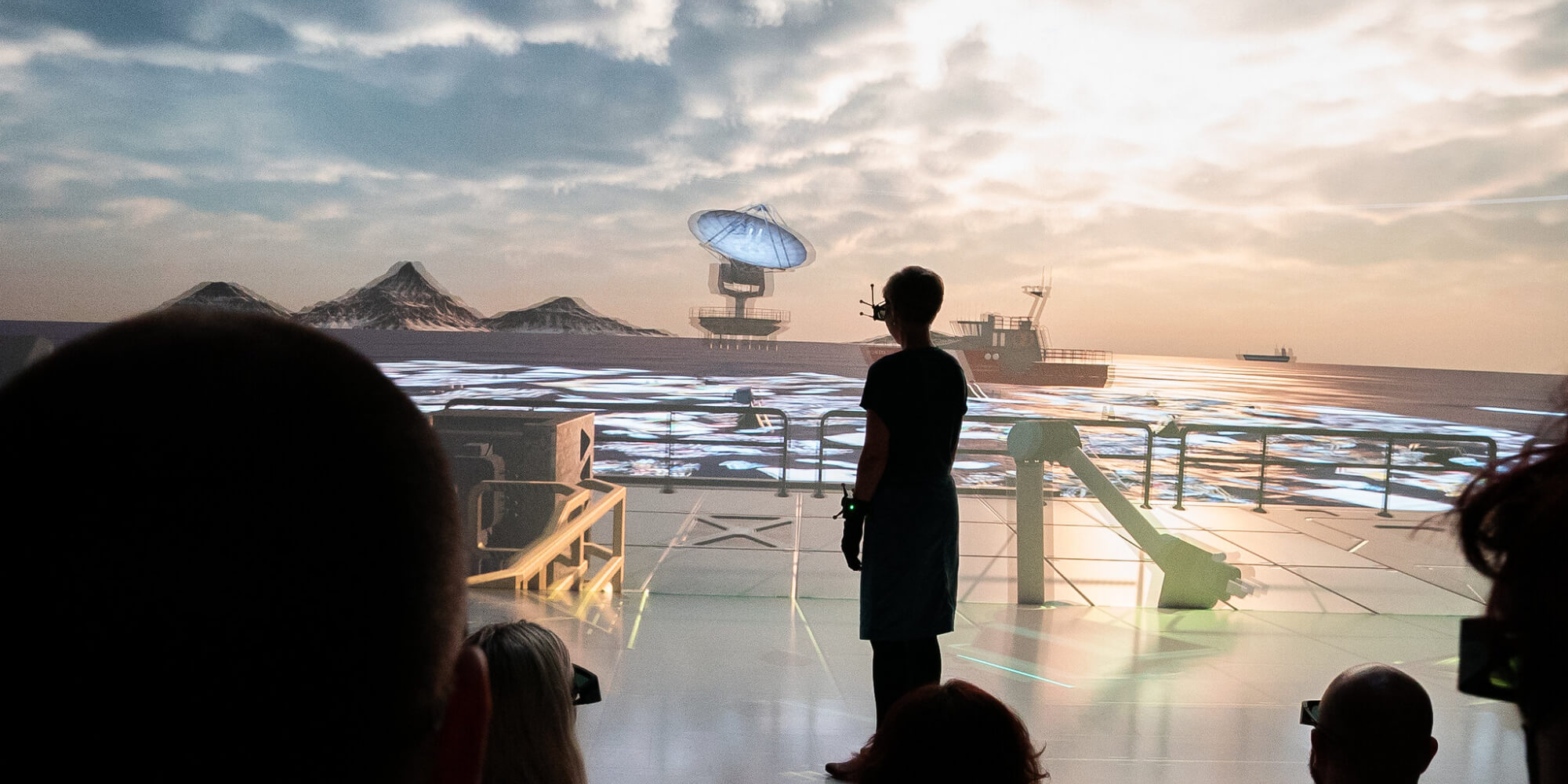Presentation in Deep Space 8K
How to communicate with robot colleagues, increase acceptance for them and create a safe work environment? With the „CoBot Studio“ research program, the LIT Robopsychology Lab of the JKU Linz, the Ars Electronica Futurelab and five other partners have been working on these and more questions for years now. After the final study in spring, immersing participants in the Deep Space 8K with a real robot co-worker, members of the research team now present the findings of this unique research project.
Presenters:
Martina Mara (AT), Johannes Kepler University (JKU)
Brigitte Krenn (AT), Austrian Research Institute for Artificial Intelligence (OFAI)
Roland Haring (AT), Ars Electronica Futurelab
Peter Holzkorn (AT), Ars Electronica Futurelab
Kathrin Meyer (DE), Johannes Kepler University (JKU)
Biographies
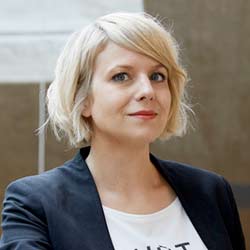 Martina Mara (AT) gratuated in Communication studies at the University of Vienna and earned her doctorate in Psychology at the University of Koblenz-Landau with a dissertation on the user acceptance of anthropomorphic machines. After having worked for non-university research institutions such as the Ars Electronica Futurelab and the Institute of Design Research Vienna for more than a decade, she became Professor of Robopsychology at the Johannes Kepler University Linz in April 2018. Her current research interests include public attitudes towards robotics and AI, psychological effects of simulated human-likeness and intention signaling of mobile and collaborative robots. Mara is a member of the Austrian Council for Robotics and Artificial Intelligence (ACRAI). She is a newspaper columnist who writes for a wide audience, regularly commenting on what is going on in the world of technology. In 2018, she received the BAWAG Women’s Prize and the Futurezone Award in the category “Women in Tech.”
Martina Mara (AT) gratuated in Communication studies at the University of Vienna and earned her doctorate in Psychology at the University of Koblenz-Landau with a dissertation on the user acceptance of anthropomorphic machines. After having worked for non-university research institutions such as the Ars Electronica Futurelab and the Institute of Design Research Vienna for more than a decade, she became Professor of Robopsychology at the Johannes Kepler University Linz in April 2018. Her current research interests include public attitudes towards robotics and AI, psychological effects of simulated human-likeness and intention signaling of mobile and collaborative robots. Mara is a member of the Austrian Council for Robotics and Artificial Intelligence (ACRAI). She is a newspaper columnist who writes for a wide audience, regularly commenting on what is going on in the world of technology. In 2018, she received the BAWAG Women’s Prize and the Futurezone Award in the category “Women in Tech.” Brigitte Krenn (AT) is Deputy Director of OFAI. For many years she was head of Unit of OFAI’s Language and Interaction Technologies Group. Brigitte Krenn’s overall research interest lies in understanding and computationally modelling human communication and interaction capabilities. Her work centers around two pilars. The one is core language technology combining linguistic analysis with state-of-the-art deep learning and data science based approaches to text processing, including language and speech understanding, text summarization, domain-specific natural language processing. The other one focuses on multi-modal communicative interaction, including modelling the behaviour of artificial agents (virtual agents, social robots and cobots), multimodal dialogue, dialogue and memory, language learning and language understanding for robots inspired by human cognition research.
Brigitte Krenn (AT) is Deputy Director of OFAI. For many years she was head of Unit of OFAI’s Language and Interaction Technologies Group. Brigitte Krenn’s overall research interest lies in understanding and computationally modelling human communication and interaction capabilities. Her work centers around two pilars. The one is core language technology combining linguistic analysis with state-of-the-art deep learning and data science based approaches to text processing, including language and speech understanding, text summarization, domain-specific natural language processing. The other one focuses on multi-modal communicative interaction, including modelling the behaviour of artificial agents (virtual agents, social robots and cobots), multimodal dialogue, dialogue and memory, language learning and language understanding for robots inspired by human cognition research.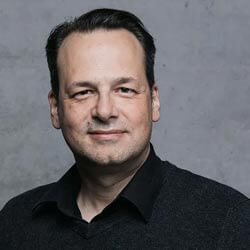 Roland Haring (AT) is Technical Director of the Ars Electronica Futurelab and co-responsible for its management, content conception and technical development. As an expert in the design, architecture and development of interactive applications, his activities include many of the lab’s large-scale, research-intensive R&D projects.
Roland Haring (AT) is Technical Director of the Ars Electronica Futurelab and co-responsible for its management, content conception and technical development. As an expert in the design, architecture and development of interactive applications, his activities include many of the lab’s large-scale, research-intensive R&D projects.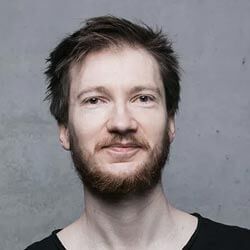 Peter Holzkorn (AT) is Key Researcher for Artificial Collectives and currently leads activities in the area of swarm robotics, such as Swarm Arena and Sky Compass. Before that, he focused on the design and implementation of software systems for distributed real-time sound and graphics, often involving sensor networks and generative content, from large-scale media art installations (ZeitRaum) and experimental audio games (Audioversum) to data-art projects (Soul of the Cube, Data Space Berlin). He also coordinates activity for the Ars Electronica Futurelab Academy, a framework for knowledge transfer with universities and organizations in related fields. Peter holds Master’s degrees in Media & Computer Science (Vienna University of Technology) and Interactive Telecommunications (New York University – Tisch School of the Arts).
Peter Holzkorn (AT) is Key Researcher for Artificial Collectives and currently leads activities in the area of swarm robotics, such as Swarm Arena and Sky Compass. Before that, he focused on the design and implementation of software systems for distributed real-time sound and graphics, often involving sensor networks and generative content, from large-scale media art installations (ZeitRaum) and experimental audio games (Audioversum) to data-art projects (Soul of the Cube, Data Space Berlin). He also coordinates activity for the Ars Electronica Futurelab Academy, a framework for knowledge transfer with universities and organizations in related fields. Peter holds Master’s degrees in Media & Computer Science (Vienna University of Technology) and Interactive Telecommunications (New York University – Tisch School of the Arts).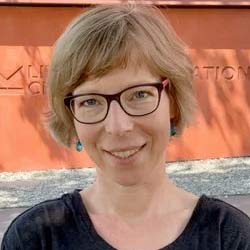 Kathrin Meyer (AT) studied Engineering for Computer-based Learning at the University of Applied Sciences Upper Austria in Hagenberg and worked for some years in the field of e-learning and knowledge management as a project manager and consultant for various customers in the German-speaking area. After several years at the Ars Electronica in Linz, she complemented her interdisciplinary competence and experience with the Master in Human-Centered Computing at the University of Applied Sciences in Hagenberg. After completing her master’s thesis on „Usability and User Interface Design in Manufacturing at Fronius Sattledt“, she worked as a user experience designer in a software company, focusing on the interaction between people and machines, especially in the work environment. She joined the LIT Robopsychology Lab as a scientific staff member in June 2019.
Kathrin Meyer (AT) studied Engineering for Computer-based Learning at the University of Applied Sciences Upper Austria in Hagenberg and worked for some years in the field of e-learning and knowledge management as a project manager and consultant for various customers in the German-speaking area. After several years at the Ars Electronica in Linz, she complemented her interdisciplinary competence and experience with the Master in Human-Centered Computing at the University of Applied Sciences in Hagenberg. After completing her master’s thesis on „Usability and User Interface Design in Manufacturing at Fronius Sattledt“, she worked as a user experience designer in a software company, focusing on the interaction between people and machines, especially in the work environment. She joined the LIT Robopsychology Lab as a scientific staff member in June 2019.